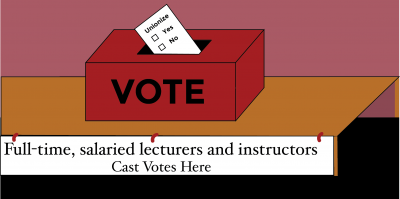
Full-time and salaried Boston University instructors and lecturers will receive mail-in ballots from the National Labor Relations Board to vote and unionize with the Service Employees International Union Local 509.
The counting of ballots, which were sent to instructors and lecturers Tuesday, will take place April 6 at the Regional NLRB office in Boston, said Somy Kim, a lecturer in the College of Arts and Sciences.
If the majority votes to unionize, approximately 275 full-time lecturers and instructors will join 800 BU adjunct professors who have successfully unionized with SEIU 509 in the spring of 2015, The Daily Free Press reported Feb. 5.
“I am very happy we are moving forward with the process, because a union will bring about a safer environment and a stable platform for us to engage in meaningful conversations with the administration,” said Liliane Duséwoir, a senior lecturer in CAS. She referred to the lecturers and instructors’ initial step to file the petition to unionize to the NLRB on March 4.
Through unionization, Duséwoir said she hopes full-time and non-tenure-track lecturers and instructors will see transparency for promotion requirements, be able to voice their opinions on course assignments and assure job security by signing a contract with the university.
“We are passionate about what we do, and we need to be able to do that with undivided attention,” Duséwoir said. “We are held in very high standards in teaching, which is completely legitimate on the part of students and parents who pay a very high tuition.”
University Provost and Chief Academic Officer Jean Morrison asked in a March 14 email for lecturers and instructors to vote against unionization.
In another email Morrison sent March 16, she noted that some lecturers currently have the opportunity to join the University Council and shape university policies. However, they will not be eligible of that privilege if they vote in favor of unionization, Morrison wrote.
“If the SEIU prevails in this election, I will pursue changes to our faculty governance that include the removal of Senior and Master Lecturers from eligibility to participate in our strategic faculty governance body, the University Council,” Morrison wrote in the email.
Morrison was unreachable for comment.
Julie Sandell, associate provost for faculty affairs, wrote in an email that she wants to encourage every voter to cast a vote in this election. However, Sandell emphasized that the voting process is run by the NLRB, and the Provost’s Office will not play any role in the process.
“We think our salaried Lecturers, Senior Lecturers, Master Lecturers and Instructors are currently treated well, as members of the faculty,” Sandell wrote. “I’ve worked to make the faculty more inclusive, so I will be disappointed if a majority of the voters decide they want to be considered differently than their faculty colleagues, but of course, that is their choice.”
Kim said the provost’s emails are “quite threatening,” and she does not feel fully represented by the University Council.
“There are only a few lecturers on faculty council … a space where faculty are supposed to have voice,” Kim said. “I don’t know to what degree they are part of the decision-making process.”
By joining the union, Kim said she hopes full-time salaried instructors and lecturers can gain a seat at the table with university administration.
“I hope a lot of people would understand [that] what we hope to achieve will only create a stronger university as a whole,” Kim said. “As opposed to thinking [of] it as the stereotype admission versus faculty, union would allow us to work together.”
Richard Deese, a lecturer in the College of General Studies, said he has been teaching at BU on and off for the past 20 years. Deese said the university has a legacy with unions, especially because its famous alumnus Martin Luther King Jr. was assassinated on his way to support a worker’s strike.
Deese said he hopes the university will keep such a legacy and encourage faculty member to join the union.
Several students expressed mixed feelings toward several members of faculty’s efforts to unionize.
Regina Raphael, a junior in the College of Communication, said if unionization can allow full-time instructors and lecturers to teach in the ways in which they are most comfortable, then students will benefit from happier professors.
“If professors can teach things they are actually passionate about, that will change the environment,” she said. “I definitely have professors who would like to teach different things, but they are following the curriculum they are given.”
Pardis Alizadeh-Shabdiz, also a junior in COM, said she is in favor of unionization because it is easier for Morrison to hear from lecturers and instructors during collective bargaining than listening to concerns from each individual.
“Having the third party involved might help, especially the provost has so much to deal with,” she said. “[That] relationship is not something you can fake, it is something you should genuinely maintain. And if you don’t have time, you should find the best form of communication.”
Libby Pell, a freshman in CAS, said she thinks professors have the right to unionize no matter what BU administrators have to say.
“If professors want to unionize, they should have the right to do so,” he said. “It’s not right that BU tried to tell them not to unionize. That’s against the law, I think.”



















































































































